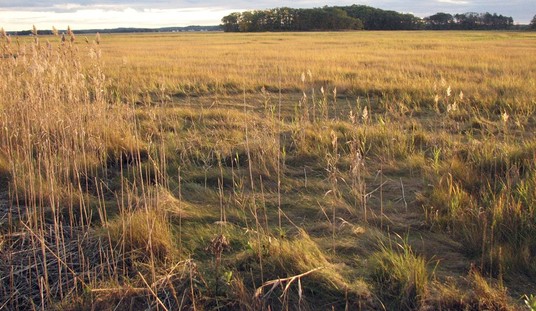I spent the last two days in the Biloxi-Gulfport area of Mississippi at the invitation of the Mississippi Chamber of Commerce to check out the impact of the Gulf oil spill on the region — or really, the lack of impact in the region. Mississippi business leaders are concerned that people have the wrong idea about their Gulf Coast area, although when asked, every single person who spoke to me refused to blame it on poor media reporting. In fact, they had high praise for the national media’s reporting, calling it fair and noting that almost all of them have included in their reports that the impact on Gulf business and food has been minimal. The problem is getting people to come down and see for themselves.
Several writers and talk-show hosts came to the area to look around and report back, with the only caveat that we disclose the fact that they covered the travel expenses. No one asked us to promise good coverage — just to talk with the people in the area and report back honestly what we find. In this post, I’m going to put the interviews I conducted on Thursday up without any editing, so Hot Air readers will hear exactly what I did. I spoke with five business and cultural leaders about the impact and recovery of the three catastrophes in the past five years to hit this region — Hurricane Katrina, the Gulf oil spill, and the recession.
Surprisingly, the Gulf oil spill turns out to have had the least impact on the people in this area. Very little oil got into this area, and the beaches all along Highway 90 were pristine-white. In fact, Mississippi is now rebuilding Deer Island a few hundred yards off the shore to restore a natural protection to the beaches, a barrier island which had been damaged over the decades by hurricanes and the destruction of vegetation by people that allowed for more rapid erosion. They were dredging the bottom of the Gulf to get the silt on top of the concrete-reinforced beach on the island, dramatically if inadvertently showing that the area has no oil or tar sticking to the bottom of the Gulf. The waters have been continually tested, as has the seafood harvested in the Gulf since this spring, and no adverse impact has been noted at all.
However, it doesn’t take long to see the scars of Katrina all around. The region has bounced back quietly but firmly, and mainly on their own power, but not everything came back. We passed scores of empty lots where historic homes once stood across Highway 90 from the Gulf, with driveways that meandered into wild grass. Other areas still need repair, and even some of the homes and structures that didn’t get destroyed by Katrina remain empty and unused. The scars of the Great Recession are mainly hidden, but in this tourist-dependent region, they are still just as real. One such scar is very visible: a planned casino and hotel called Margaritaville, owned and operated by Harrah’s in apparent partnership with (or at least under license to) Jimmy Buffet, whom residents proudly note attended Southern Miss. The project started construction in 2008 but halted with only the skeleton of the massive complex in place, and now it looks as if it may be a while if it proceeds — if ever.
Still, the region has several large casinos and resort hotels, including the Beau Rivage, where I am currently staying, as well as the Hard Rock Casino, where others in our group stayed. We have spent the last two days eating the local seafood, which certainly has been as safe as it is tasty. One of the highlights of the trip was dinner on Thursday night at Mary Mahoney’s, where owner Bob Mahoney did a half-hour of rapid-fire jokes and a review of the history of the area and his restaurant that I wish I’d caught on videotape. (Bob looks a little like a younger James Carville, and is even more entertaining.) I found out later that this is considered perhaps the finest restaurant in the region, and the food certainly met that kind of reputation, and even exceeded it. The building itself is over 270 years old. Yesterday I toured the Gulf, about which more will be coming in a separate post.
I would be remiss if I failed to mention the people of the area. Without fail, they have been warm and welcoming, and not just the folks you’ll see in these interviews. The people of Biloxi and Gulfport want people to visit and to see that they are open for business. When they find out that we are visiting, they always ask us to tell the people back home that they’d love to have them pay a visit to this area — and from what I’ve seen, they would not be disappointed.
Update: The picture on the front page was the view from my hotel window of the beach as it stretches to the west, taken about 7:30 this morning. Here’s a larger version of the same picture:
Now for the interviews, which in most cases were conducted in partnership with my friend Kerry Picket of the Washington Times, whom you will see occasionally. First, we spoke with Jack Norris, the president of the Gulf Coast Business Council, and who had been a staffer at one time for Trent Lott. I’ve been told that people see a bright future in politics for Norris, but he remained focused on business in our interview:
Next we spoke with Michigan native but long-time resident Margaret Miller, of the Ocean Springs Chamber of Commerce. Having both lived in cold-weather areas of the country, Margaret and I teased each other about winters:
Eric Zala represented the cultural leadership of the Biloxi-Gulfport region, and discussed the role of the Mary C. O’Keefe Cultural Center in helping to revitalize the region. You’ll see one edit in this interview, as my batteries ran down and I had to replace them:
Karen Sock had spent several years in the casino industry in Mississippi, but now runs her own consultancy, Sock Enterprises. We discussed the gaming industry and the state of business health in the area:
Last, we spoke with Bill Holmes, who runs the Mississippi Coast Coliseum and Convention Center, where we had set up our Radio Row (and from which I did my TEMS shows the past two days). Bill also talked about the business health of the area, but Kerry does a good job at the end of drawing Bill out a little on issues like tax rates and the impact of ObamaCare on business, something that other interviewees more or less avoided:









Join the conversation as a VIP Member